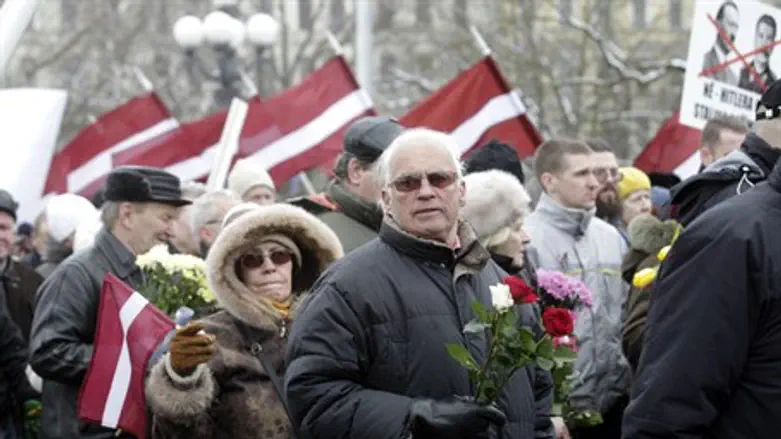
Latvian veterans who fought on Nazi Germany's side against the Soviets in World War II staged a controversial march in Riga on Monday to mark the anniversary of a 1944 battle.
Around 1,500 people took part in the parade through Riga's Old Town amid massive police security, Latvia's deputy chief of police Artis Velss told AFP, with no arrests reported by midday.
Self-styled anti-fascist groups were due to hold their own demonstration immediately after the main parade had concluded, according to an agreement with police.
Veterans of the Latvian Legion have paraded in Riga every March 16 since Soviet rule ended in 1991. The date marks a failed 1944 battle to repel the Soviet Red Army, paving the way for nearly half a century of occupation.
Jewish groups, Russia, and Latvia's large ethnic-Russian community which accounts for a quarter of the country's two million citizens, see the parade as glorifying genocidal Nazism because the Legion, founded in 1943, was commanded by Germany's Waffen SS.
Efraim Zuroff from Jerusalem's Nazi-hunting Simon Wiesenthal Center told AFP the parade was "one big lie" and a "distortion of history" as he observed the event in central Riga.
"Among the ranks of the Latvian Legion were quite a few people who participated in the mass murder of Jews. And these are the heroes of the new Latvia?" Zuroff said.
Veterans claimed they were trying to defend their small homeland against Soviet occupation during their collaboration with the genocidal Nazi war machine.
"They (Legion members) didn't want a return of Soviet occupation and felt they were doing the right thing," 81-year-old Janis Lusis told AFP, adding that his brother was a member of the group.
Some 140,000 Latvians, mostly conscripts, fought in the Legion. Roughly a third died in combat or Soviet captivity.
Another 130,000 Latvians sided with the Soviets, and almost a quarter were killed, many in battles with Legion compatriots.
Moscow seized Latvia under a 1939 deal with Berlin carving up eastern Europe, and later deported 15,000 Latvians to Siberia.
Germany drove out the Red Army when it ripped up the pact and invaded the Soviet Union in 1941.
Some Latvians hailed the Nazis as liberators. But they brought terror, massacring 70,000 of the country's 85,000 Jews, aided by local
collaborators.
The Soviets recaptured Riga in October 1944 and held on to the country until the communist bloc crumbled in 1991.